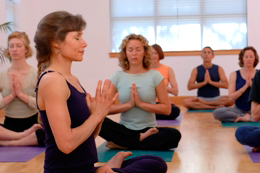01 November 2016
 A world-first University of South Australia study published today in Frontiers in Psychology has shown that a session of meditation can actually help individuals develop long-term memories necessary to perform newly-learned movement-based skills.
A world-first University of South Australia study published today in Frontiers in Psychology has shown that a session of meditation can actually help individuals develop long-term memories necessary to perform newly-learned movement-based skills.
Practicing movement skills helps to produce fragile new memories which can be lost or interfered with unless they are consolidated into long-term memory.
Since the consolidation of memory is an essential component of learning and maintaining performance gains from practice, identifying approaches to supporting this process is important.
The study by UniSA Human Movement Senior Lecturer in the School of Health Sciences, Dr Maarten Immink, is the first scientific investigation of meditation as a potential facilitator of memory consolidation and the findings are promising for anyone interested in the learning of movement-based skills.
“The results of this study are promising because they suggest meditation can help to store newly formed memories and this has positive applications for situations where new movement-based skills are learned including in industry, physical education and sport,” Dr Immink says.
“There are also potential applications in clinical settings including rehabilitation where movement-based skills have to be re-learned.”
A period of sleep has long been accepted an important way for human beings to consolidate memory but current research is not entirely clear with respect to the requirement of sleep for memory consolidation.
Dr Immink noted that instead of sleep, memory consolidation might be based on establishing certain brain states in the period that follows practice.
“In my study, individuals practiced a novel movement skill similar to playing a short sequence of notes on a piano or typing on a keyboard,” Dr Immink says.
“A few hours later, half the group completed a meditation session while the control group completed light work duties before all individuals were tested, again after a delay, on how fast they could produce the sequences they previously practised and new, unpractised, sequences.
“The people that had meditated maintained their performance between the end of practice and the test while the control group demonstrated a loss of performance at test relative to the end of practice.”
The benefit of post-practice meditation was limited to practised sequences suggesting that only newly formed memories specifically formed through practice were able to be consolidated through memory.
“That the post-training meditation performance benefit was specific to trained sequences is consistent with the notion of meditation promoting motor memory consolidation as opposed to general motor task performance benefits from meditation,” Dr Immink says.
“Post-training meditation also appears to have promoted motor memory stabilisation and this is the first time a study has shown a connection between meditation and motor memory consolidation and is consistent with a growing body of literature showing the benefits of meditation for cognitive function, including memory.”
The study involved participants who were experienced meditators and Dr Immink is conducting future research to investigate the level of meditation experience that is needed to obtain memory consolidation benefits from a session of meditation following movement skill practice.
This will include research with participants who have not previously practiced meditation.
Post-training Meditation Promotes Motor Memory Consolidation by Dr Maarten Immink was published in Frontiers in Psychology today.
Media contact: Katrina McLachlan mobile: +61 414972537 email: katrina.mclachlan@unisa.edu.au



